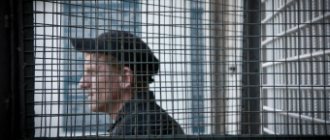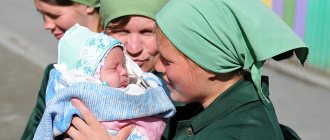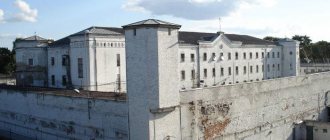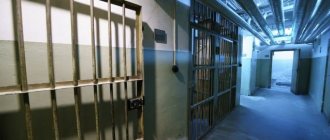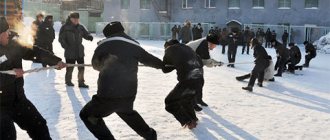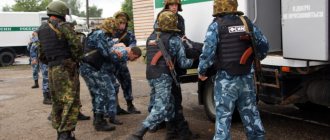A life sentence is not just a harsh sentence, but truly cruel. The “inmates” admitted that they would happily choose the death penalty, but since the mid-nineties there has been a moratorium on capital punishment in Russia.
It is not by chance that convicts say this. Any prison in Russia is already a harsh and joyless place, unlike, say, European places of detention; and domestic prisons for especially dangerous criminals are probably branches of hell on Earth.
After serving twenty-five years, a person sentenced to life has the opportunity to be released on “parole.” However, only one such case has been known in history. The remaining criminals end their lives behind bars.
It is clear that the “population” of such establishments does not consist of ordinary criminals. All these are people who are especially dangerous to society: maniacs, terrorists, militants, crime bosses. Isolating them for life from other citizens is perhaps the most humane thing that can be done with them.
Life prisoners in Russia are kept in special prisons, of which there are only seven in the country. Some of them were converted from Gulag institutions. The living conditions there are extremely terrible. After all, these prisons do not have the goal of re-educating convicts, since they will most likely never be released again. So it is forbidden to work here and study in absentia at universities; inmates are not allowed to go for walks in the fresh air.
IK-6 "Black Dolphin"
Located in the city of Sol-Iletsk, in the Orenburg region. This is the largest prison for lifers in Russia. The lights in the cells are on here around the clock, and between cells and from the paddy wagon to the building, convicts are led with bags on their heads in order to disorient them. The colony earned its unofficial name thanks to the sculpture of a black dolphin, created by the hands of prisoners and installed in the courtyard.
Torbeevskaya prison
The prison in Torbeevo did not appear immediately. During the Soviet years, there was a pre-trial detention center No. 3, where those suspected of committing crimes and those awaiting trial were kept. The pre-trial detention center functioned until 2013, and then the authorities decided to turn it into a special regime colony instead of a pre-trial detention center. As a result, all the defendants were transferred to the Saransk pre-trial detention center, and the FKU IK-6 prison of the Federal Penitentiary Service of Russia in the Republic of Mordovia appeared in Tarbeevo.
Torbeevskaya prison
For such an institution, it was necessary to carry out work to organize security - video surveillance was organized, security system sensors and a triple fence were installed. Also a significant factor that could eliminate the desire for escape for prisoners was the dense Mordovian forests.
Room for working with a psychologist in Torbeevsky Central
In order for the prison to generate at least some income, sewing workshops were organized here, which sew not only work clothes, as is customary in other colonies, but also uniforms for law enforcement agencies.
Kitchen in Torbeevsky Central
The prisoners themselves, specially selected from other colonies in Russia, took part in the repair work to “transform” the pre-trial detention center into a prison - those prisoners who were engaged in construction before the trial were selected. For their help in their work, they were allowed some benefits - the cells were equipped with good beds with orthopedic mattresses, private bathrooms and the opportunity to watch TV with DVD. Also, the “builders” could use the shower room and keep small animals in the cells.
Forest zone
Convicts serving life sentences in Torbeevo are in quite comfortable conditions by the standards of Russian zones. Each prisoner in IK-6 has 7.5-8 square meters of living space, with the standard being six “squares”.
The chambers have ventilation through which hot or cold air is supplied depending on the season. In addition, each cell has a washbasin with hot water and a toilet with toilet.
True, despite this comfort, the inmates of Torbeevsky Central do not like it because of a very serious security system - one of the most modern. It is believed that it is impossible to deceive her. In addition, IK-6 is surrounded by forests, which makes a potential escape difficult.
Photo: Federal Penitentiary Service
Each room is equipped with at least two CCTV cameras. The windows and doors in IK-6 are equipped with special security sensors, and the three two-story buildings are surrounded by a triple fence: it is impossible to escape from there.
When the jailers appear, each prisoner must stand facing the wall, spread his legs and arms, palms forward, and then read out his information and the articles under which he is serving his sentence.
The Torbeevsky Central employs about 220 employees, the selection of whom the zone administration takes very seriously: the slightest mistake in communicating with especially dangerous convicts can cost every jailer his life.
Before entering the Torbeevsky Central, future employees of the zone undergo training in a special center in another Mordovian colony. A psychologist regularly works with employees - he teaches them how to monitor speech, facial expressions and gestures, as well as “use psychological techniques in communicating with special forces.”
Notes
: Incorrect or missing image To improve this article it is desirable: - Find and arrange in the form of footnotes links to independent authoritative sources that confirm what is written. K: Wikipedia: Articles without sources (type: not specified)
- After adding footnotes, provide more precise indications of sources.
- Correct the article according to Wikipedia stylistic rules.
Thugs of the Torbeevsky Central
Naturally, a special regime colony contains a special contingent. These are maniacs, murderers and terrorists. One of the most famous inmates is Lev Molotkov, a native of Sergiev Posad.
Lev Molotkov at trial
Having a computer education, Lev headed the military wing of the extremist group “National Socialist Society (NSO) - North” banned in Russia. Members of the group committed murders of Caucasians, as well as visitors from Asian countries. In total, it was possible to prove 27 murders committed by this criminal organization. Moreover, the leader of the “North” Lev Molotkov himself did not kill anyone, acting as the organizer and coordinator of the murders.
Lev Molotkov in the Torbeevsky Central
What’s interesting is that, unlike other people imprisoned for life, Lev Molotkov’s parents, who have been visiting their son in prison for 11 years, did not turn away. They even come to see him in the Mordovian colony after he was transferred here.
Serial killer and rapist Dmitry Balakin is from Mordovia, and is serving his life sentence not far from his small “homeland”. Since childhood, he was aggressive and constantly beat up his peers, and then switched to assault and robbery.
Dmitry Balakin in court
By the time he came of age, the family moved from Ruzaevka to Nizhny Novgorod. Here, at the age of 18, he first went to prison for robbing two women. After serving his sentence, Dmitry Balakin moved to Saransk, where he began his hunt for girls. In 2003, he raped and strangled three local students.
Dmitry Balakin at the Torbeevsky Central
The next time the maniac went hunting was in 2006, after an accident. He had a leg injury, this saved his victim, who was able to fight off the criminal and run away from him. In the future, the rapist will be caught and convicted. He will spend his last days in Torbeevsky Central.
Vladimir Alekseev, nicknamed Vova Bespredel, is also serving his life sentence here. He was an active member of the Tsapok gang from the village of Kushchevka, which was a nightmare for its residents.
In the center stands Vladimir Alekseev (Vova Bespredel), on the left: Sergei Tsapok
Vova Bespredel took part in the bloodiest atrocities of the gang. The most merciless crime was the massacre of the family of farmer Akhmetov in the fall of 2010, when Alekseev and his accomplices killed 12 people, including four children.
Vladimir Alekseev (Vova Bespredel) in the Torbeevsky Central
Alekseev is also accused of rape and attempted murder. Vova Bespredel tried to kill Tsapok’s business competitor by pushing him into the trunk of a car and taking him to the forest, where he was going to bury him alive. However, the poor fellow managed to jump out of the trunk at full speed and disappear into a corn field. At the Torbeevsky Central, Alekseev is engaged in edging vests.
Correctional Colony No. 1
People call this prison “Unit”. It is located in the Mordovian village of Sosnovka. Along with the usual zone, there is a block of life imprisonment or PLS. Currently, 165 prisoners are serving sentences there. These are especially dangerous criminals, most of them murderers. Collectively, these 165 prisoners took the lives of more than 600 people.
The PLS is separated from the rest of the area by a high fence with barbed wire. The corridors of the prison are clean and cosmetically renovated. On each of the doors in the IK-1 building there are photographs of prisoners. It also provides general information about each of the inhabitants of the cell, namely crimes committed and articles. The cards also indicate the behavioral characteristics of each prisoner. This is required so that guards do not lose their vigilance, knowing what to expect from a particular criminal.
The cells are designed to hold from one to four people. When relocating prisoners, psychological compatibility is taken into account, because the main goal of the colony staff is to eliminate internal conflicts.
The cells are well ventilated, equipped with a washbasin with cold and hot water, and a toilet. Prisoners shower in a separate room twice a week.
Work and leisure of prisoners
Most of the criminals held in colony IK-1 are employed. However, the special status of prisoners imposes certain restrictions on work activity. Here, prisoners do not work in common workshops, but in separate cells equipped with everything necessary. Moreover, cellmates work together, which eliminates possible conflicts.
The life imprisonment building is equipped with a medical unit. The examination is carried out through the bars, which ensures the safety of medical personnel.
Walks are carried out in specially equipped outdoor cells. The duration of the procedure is one and a half hours. Walks are carried out daily, under the supervision of guards. Moreover, prisoners can only be in the exercise yard with their cellmates. This completely eliminates the possibility of communication between prisoners from different cells.
Every year, life prisoners can count on two long visits with relatives. The duration of such meetings is up to three days. There are special rooms in prison for visits.
Have a question for a lawyer? Ask now, call and get a free consultation from leading lawyers in your city. We will answer your questions quickly and try to help with your specific case.
Telephone in Moscow and the Moscow region: +7
Phone in St. Petersburg and Leningrad region: +7
Free hotline throughout Russia: 8 (800) 301-39-20
Sour milk and a screwdriver in the stomach
In Torbeyevsky Central, as in any colony, short-term and long-term visits are allowed - the premises for the latter are similar to apartments with bedrooms, bathrooms and kitchens. Prisoners in IK-6 can receive parcels, but only if their weight is less than 20 kilograms.
True, according to the wife of Sergei Klimuk, convicted of the explosion at the Cherkizovsky market (he was transferred to the Torbeyevsky Central in 2016), prison guards can allow more office supplies and a bottle of holy water in excess of the limit. All mail from convicts must be censored.
However, as in any zone, IK-6 is not without complaints. Thus, in July 2022, the chairman of the interregional public charitable organization (MOBO) “Committee for Civil Rights” Andrei Babushkin sent a letter to the supervisory authorities about violations at the Torbeevsky Central.
The human rights activist listed a number of everyday issues with which the convicts were dissatisfied - from sour milk and rotten cereal to the lack of televisions.
According to Babushkin, there were more serious violations in IK-6, such as beatings of prisoners. In particular, according to the human rights activist, the prisoners were brutally beaten after they complained to the prosecutor about the quality of the food.
In addition, convicts who in the spring of 2022, as a sign of protest, opened their veins with sewing needles were allegedly subjected to physical punishment. One of them drove a screwdriver into his stomach. However, after inspections, all complaints were found to be unfounded.
However, listing all the violations, Babushkin says: twice a day, prisoners in IK-6 are examined by a medical worker, and salaries are credited to their accounts without delay.
Only 25 percent of the prisoners' salaries remain: in most cases, the rest of the money goes to pay compensation to victims and their relatives. Convicts of IK-6 can spend their earnings on orders from the prison catalog - they mainly buy tea, coffee, candy and cigarettes.
These orders are one of the few entertainments for prisoners at the Torbeevsky Central: in addition to them, prisoners can read books and play board games. Chess is especially popular: almost all convicts took part in the tournament, which took place in May 2022.
*** Today, almost 500 prisoners are serving their life sentences in the Torbeevsky Central. But if necessary, the colony can accept more. However, I would like to hope that the free cells in Torbeevo will remain empty.
lenta.ru
Russian prisons for lifers
The total number of prisoners in Russian prisons designed to house rapists, serial killers and terrorists is more than 2,000 people. Moreover, the living conditions of prisoners have improved significantly in recent years. Most prisons underwent cosmetic renovations, new hospital buildings were built, and the prisoners themselves received the opportunity to earn money.
The former gloomy casemates have been transformed. If earlier, when prisoners got here, they preferred to be shot, today many of them hope to be free someday, starting a new life. And the current legislation of the Russian Federation does provide for such a possibility - life prisoners have the right to parole after 25 years of “serving”. However, it will be much more difficult for such criminals to be released, given the severity of the crimes committed.
Most of the prisons for life prisoners or “wads” are located in the European part of the Russian Federation. There are two such colonies in Mordovia.
